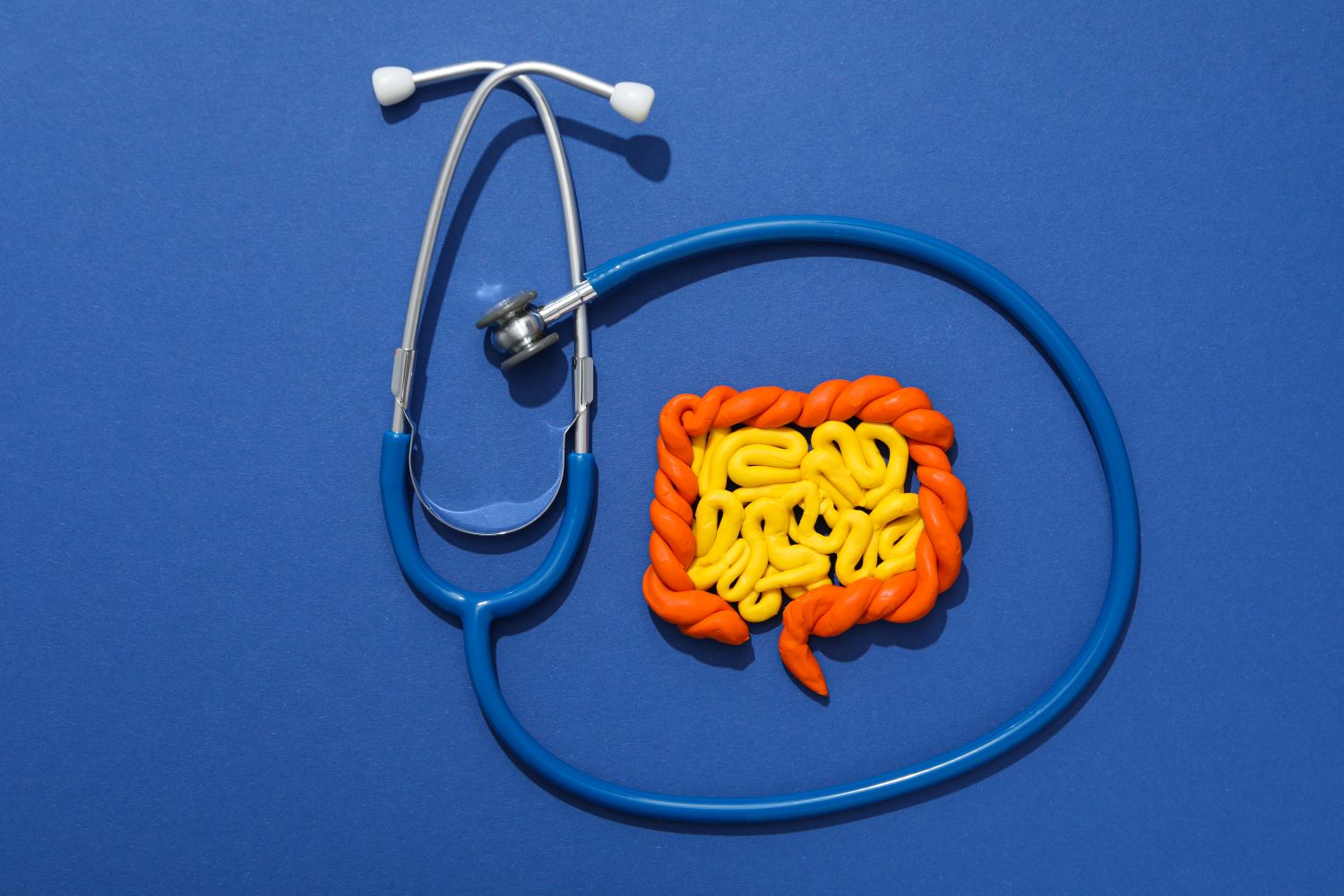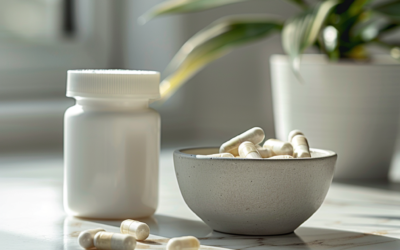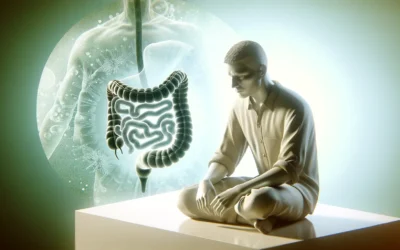SIBO
Small intestinal bacterial overgrowth (SIBO) can be a complication of IBS, with up to 78% of people with IBS also receiving an SIBO diagnosis. Rates of SIBO are lower in the general population, affecting 40% of people without IBS.
As its name suggests, SIBO primarily affects the small intestine. The small intestine is part of the digestive system and is responsible for breaking down food into nutrients the body needs to thrive. It also helps with waste disposal.

How We Help
SIBO is a collection of symptoms that occur due to bacterial overgrowth in the small intestine. The exact protocol depends on the type of SIBO but may include antibiotics, supplementation, or diet changes.
Are you tired of dealing with symptoms of an unhealthy digestive system? Revolution Gut Health’s services are exclusively for people who want to improve their gut health. Book a consultation today to learn more!
Disclaimer: The health information on this site is provided for general informational and education purposes only and is not a substitute for professional advice. Accordingly, before taking any actions based upon such information, we encourage you to consult with the appropriate professionals. The use or reliance of any information contained on this site is solely at your own discretion. Revolution Gut Health does not claim to heal, treat or cure any of the conditions mentioned.
What is Small Intestinal Bacterial Overgrowth (SIBO)
Small Intestinal Bacterial Overgrowth (SIBO) is a gastrointestinal disorder characterized by an abnormal increase in the number of bacteria in the small intestine. This condition can lead to various digestive symptoms and nutrient malabsorption.

SIBO Symptoms
As mentioned, SIBO (small intestinal bacterial overgrowth) affects the small intestinal microbiome. It occurs when too much bacteria invades the region.
The symptoms of SIBO can vary from mild to severe and often overlap with those of other gastrointestinal disorders. Common symptoms include excessive gas, diarrhea, and, in extreme cases, nutritional deficiencies. Other signs of SIBO include:
- Abdominal pain or discomfort
- Bloating
- Nausea
- Indigestion
- Weight loss
- Fatigue
SIBO Stool
One way to identify SIBO is to look at someone’s stool. People with SIBO are often deficient in bile acids. Bile acids are responsible for breaking down and absorbing fat for use throughout the body.
When this process does not occur, it may result in an abnormally pale stool color. Other ways to identify SIBO in stool is the presence of bulk and/or an especially bad smell.
SIBO Tongue
Some people develop a white film on their tongues from SIBO. A white tongue often indicates an issue with the digestive system. The thicker the coating is, the bigger the problem.
However, a white tongue may also be a symptom of other conditions such as thrush, anemia, or scarlet fever. People who experience these symptoms should consult a doctor to discover the cause.
SIBO Constipation
While diarrhea is a common symptom of SIBO, constipation can also occur. Constipation may have a link to SIBO’s impact on certain types of methane-releasing small intestine bacteria.
Other experts believe this symptom may have more to do with SIBO’s connection to IBS. IBS stands for irritable bowel syndrome. One of the condition’s hallmark symptoms is alternating diarrhea and constipation.
Have A Question?
Contact our team for a FREE discovery call.
Not accepting new patients at this time
Causes of SIBO
Although SIBO can occur due to several underlying factors, the real cause of SIBO is a poorly functioning digestive system. We rely on our liver, kidneys, stomach acid, and mouth to maintain the correct ecological conditions for our microbes to develop in the correct types and amounts inside of us. If there is any issue with these functions, we see changes in the microbes that are living there.
Stress & Hypertoxicity
The two main reasons these organs stop working correctly? Stress & Hypertoxicity.
These conditions directly affect our autonomic nervous system and are related to the proper stimulation and functioning of the digestive tract, among multiple other important functions.
Stress and Hypertoxicity triggers multiple imbalances in the growth patterns of your small intestinal bacteria, driving all the symptoms known to be associated with SIBO. Knowing the root cause of the problem is fundamental for improving this condition efficiently and reducing the chances of it reoccuring.
Without using antibiotics, antimicrobials, or any other invasive type of treatment, we can help you improve this and many other conditions for good.
So far, experts are not entirely sure what causes SIBO, though genetics may play a role. Low levels of stomach acid, dysmotility, or an abnormally small intestine may also give rise to the above symptoms.
Further, overusing certain medications (e.g., antibiotics) could be to blame. Other risk factors for SIBO include aging, immune disorders, surgical interventions, and pre-existing GI issues, such as diabetes, IBS, and IBDs like Crohn’s.
What Are the Types of SIBO?
There are three types of SIBO: hydrogen SIBO, methane SIBO, and hydrogen sulfide SIBO. People can have only one type of SIBO, or they may have two or three at the same time.
Hydrogen SIBO
Bacteria in the gut and small intestines produce a lot of gas. One of them is hydrogen (H2). People with multiple types of SIBO with more symptoms attributable to hydrogen would have hydrogen-dominant SIBO.
Signs someone might have hydrogen or hydrogen-dominant SIBO include severe stomach bloating or discomfort and diarrhea. In extreme cases, people with this type of SIBO may experience dehydration or malnutrition.
Methane SIBO
Often, people who experience chronic constipation as a primary symptom have methane or methane-dominant SIBO.
This type of SIBO is unique because, unlike others, bacteria do not cause it. Instead, archaeans that are known as methanogens lead to symptoms like weight gain and a higher ratio of body fat. diarrhea is also possible, though less common.
Treating methane SIBO is not always easy. Antibiotics do not always work since they target bacteria, not archaea. Many people try antimicrobial supplements and/or diet changes instead.
Hydrogen Sulfide SIBO
Hydrogen sulfide SIBO is more similar to the hydrogen than methane type because the gas is produced by bacteria, not archaea. This type leads to typical SIBO symptoms, including diarrhea, stomach pain, and excessive gas.
However, if left unchecked, hydrogen sulfide SIBO can also impact the nervous system. Hydrogen sulfide is a neurotoxin in large amounts. As such, it may cause tingling in the hands or feet and sensitivity to light or sound.
The best treatment for this type of SIBO is to reduce sulfur intake. The goal is to prevent the production of hydrogen sulfide gas. So, people with hydrogen sulfide SIBO should limit their consumption of sulfur-containing foods.
SIBO Testing
There are currently three tests available to identify SIBO. They include:
Small Intestine Aspiration and Quantitative Cultures
Small intestine aspiration and quantitative cultures involve taking a bacterial sample from the small intestine. This test is ideal for diagnosing SIBO because it takes place in a lab setting.
Urinalysis
However, this SIBO test is not always accurate and can be cost-prohibitive for some people. Getting a urinalysis is much simpler and more affordable, but it also has drawbacks in that the test results can be skewed.
Breath Testing
A breath test is the easiest and most affordable way to find out if someone has SIBO. These tests are available in a lab, or someone can take one at home. The lab-administered tests are pricier but offer more accurate results.
This option comes in two varieties: glucose and lactulose breath tests. Some experts prefer lactulose SIBO breath testing because it may provide more accurate results.
SIBO Treatment
The best line of defense against SIBO is to treat the underlying cause. For example, say someone’s symptoms are caused by low stomach acid. In that case, hydrochloric acid or vitamin B12 supplements may help.
Otherwise, antibiotics and fecal microbiota transplants (FMTs) are the most common treatments for SIBO. The antibiotic rifaximin works best for hydrogen-dominant SIBO, while neomycin is ideal for methane-dominant SIBO.
FMTs are newer treatments and should be used with caution. Some clinical reports have seen improvements in SIBO from FMT. Others have found the exact opposite: FMT may increase the risk of SIBO.
SIBO Natural Treatment
Many people with SIBO want to avoid medications. The good news is that some natural supplements can help with SIBO symptoms. Most commonly, people with SIBO use supplements containing the following ingredients:
- Berberines like philodendron, goldenseal, or barberry
- Polyphenols like propolis, cloves, and oregano leaf
- Herbaceous extracts like oregano, thyme, or peppermint oil
Other natural ingredients to try are neem and allicin. Neem is a type of tree that produces beneficial fruit, seeds, leaves, stems, and bark. Allicin is a compound found in common household garlic that has antimicrobial effects.


SIBO Die-Off Symptoms
Treating SIBO is a lot like incorporating a new skincare ingredient. Sometimes, symptoms worsen before they get better. A flare-up of SIBO symptoms after starting a new treatment regimen is also known as the die-off reaction.
Experts refer to this phenomenon as a ‘die-off’ because symptoms occur due to dying bacteria. As bad or excessive bacteria decay, they let off gasses and other toxins, which may lead to the following SIBO die-off symptoms:
- Bloating
- Stomach pain or discomfort
- Fatigue
- Muscle aches
- Fever
The good news about these symptoms is that they will go away eventually. In the meantime, it is crucial to stick to the treatment despite these uncomfortable side effects.
Diet for SIBO
It was mentioned earlier that certain dietary changes may help with SIBO symptoms. For instance, readers may recall that sulfur-dominant SIBO can benefit from a diet lower in sulfur-containing foods. That is not the only type of diet that may help with SIBO. Other diets for people with SIBO include:
The Low FODMAP Diet: Requires cutting out or reducing consumption of high-FODMAP foods like dairy, wheat, and certain fruits and veggies
The Specific Carbohydrate Diet: Requires restriction of grains and grain-based products, sugar, and lactose
The Low Fermentation Diet: Requires reducing consumption of whole grains and complex carbs
The Elemental Diet: Requires consumption of liquids only to reduce stress on the digestive system

Of these, the Elemental Diet is the only option studied as a SIBO treatment. The other diets are better for symptom management.
The conclusion to take away here is that dietary changes may help with the symptoms or even the underlying causes of SIBO. However, more research is needed to understand which diet(s) is best and under what circumstances
Additional Resources
Natural Remedies for SIBO: Harnessing the Power of Oregano Oil
SIBO, or Small Intestinal Bacterial Overgrowth, is a common digestive disorder that can cause a range of uncomfortable symptoms such as bloating, abdominal pain, diarrhea, and constipation. If you're looking for natural remedies to help manage...
Exploring the Benefits of Berberine for SIBO Treatment
Berberine, a powerful compound derived from various plants, has been gaining attention for its potential in managing small intestinal bacterial overgrowth (SIBO). SIBO is a condition with excessive growth of bacteria in the small intestine, leading...
Is S. boulardii Good for SIBO? What You Need To Know
Small Intestinal Bacterial Overgrowth (SIBO) is a common condition that affects the gut microbiome, leading to various digestive symptoms. Many individuals with SIBO are turning to natural remedies, such as probiotics, to alleviate their symptoms...
Soothing SIBO Symptoms: The Healing Power of Ginger
Small-intestine bacterial overgrowth (SIBO) is a condition that can cause discomfort and digestive problems. Understanding the causes and symptoms of SIBO is crucial to finding effective relief. In this article, we will explore the healing powers...
Is Coffee SIBO-Friendly? What You Need To Know
Have you ever wondered whether coffee is SIBO-friendly? SIBO, or small intestine bacterial overgrowth, is a condition with excessive bacteria growth in the small intestine. It can lead to a range of digestive issues and discomfort. In this article,...
Natural Ways to Relieve SIBO Fatigue: Recognizing the Signs and Symptoms
Fatigue has become a common complaint. But what if your fatigue is more than just a symptom of a deeper issue, such as small intestinal bacterial overgrowth (SIBO)? Does SIBO cause fatigue? SIBO is a condition where bacteria that typically reside...
Understanding The Impact of SIBO and Alcohol: A Comprehensive Guide
Small Intestinal Bacterial Overgrowth (SIBO) is a condition that affects many people around the globe. It occurs when there is an overgrowth of bacteria in the small intestine, leading to various uncomfortable and disruptive symptoms. Understanding...
Your SIBO Test Results: A Comprehensive Interpretation Guide
Small Intestinal Bacterial Overgrowth (SIBO) is a condition that affects millions of people worldwide. The most crucial step in managing SIBO is accurately understanding and interpreting your test results. This comprehensive guide walks you through...
SIBO and the Role of a Specialist
Small Intestinal Bacterial Overgrowth (SIBO) is a gastrointestinal disorder that occurs when there is an abnormal increase in the number of bacteria in the small intestine. While the condition may seem simple, it requires the expertise of a SIBO...
Unlock a healthier you today!
Take the first step towards a happier, healthier life with our FREE discovery call.
Not accepting new patients at this time








